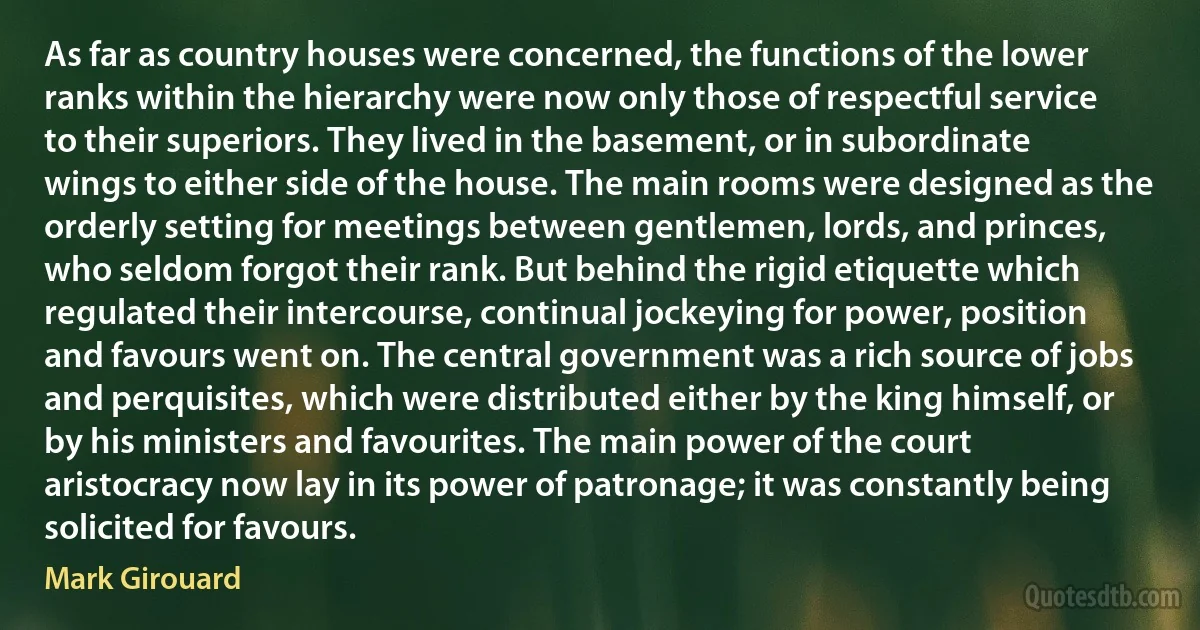
As far as country houses were concerned, the functions of the lower ranks within the hierarchy were now only those of respectful service to their superiors. They lived in the basement, or in subordinate wings to either side of the house. The main rooms were designed as the orderly setting for meetings between gentlemen, lords, and princes, who seldom forgot their rank. But behind the rigid etiquette which regulated their intercourse, continual jockeying for power, position and favours went on. The central government was a rich source of jobs and perquisites, which were distributed either by the king himself, or by his ministers and favourites. The main power of the court aristocracy now lay in its power of patronage; it was constantly being solicited for favours.
Mark GirouardRelated topics
aristocracy basement behind central country court far went government hierarchy house intercourse king lay lower now orderly patronage position power rich rigid service side source subordinate wings lordsRelated quotes
...what would be most extraordinary is this, that anybody who considered the state of the Liberal party then [1896] and now should expect me voluntarily to return to the Liberal party. (Laughter.) I left the Liberal party because I found it impossible to lead it, in the main owing to the divisions to which I referred in my letter. (Hear, hear.) The Liberal party in that respect is no better now, but rather worse; and it would indeed be an extraordinary evolution of mind if, after having left the Liberal party on that ground, I were to announce my intention of voluntarily returning to it in its present condition. No, gentlemen, so far as I am concerned, I must repeat what I have said on that subject in all my speeches, that for the present, at any rate, I must proceed alone. I must plough my furrow alone.

Archibald Primrose, 5th Earl of Rosebery
Britain for a long time had a reflection of its class structure which meant that people like, well, J. B. S. Haldane who was the nephew of Lord Haldane, or Bertrand Russell who became Lord Russell, could do what they pleased, and it's interesting to think that Bertrand Russell never had a job, he never had to compete for a job. Haldane had four or five different jobs in his life, totally different. He probably could have - if he had been bothered - have just abandoned his job and went on to live otherwise. ... But this no longer exists. IBM no longer exists. I don't see a place now where somebody like myself who combined, let's say, unusual gifts and unusual tastes and, who everybody said has promise, was certainly a misfit of the worst kind could find a position at this point and I think that a tragedy.

Benoît Mandelbrot
I helped my father who was a house painter and decorative painter. He made stage sets, he made glass paintings, he made everything. I was in the workshop and watched him. So as a child so-called art was not my view. That was, in my opinion, my father's job. But I liked to watch him; he comes, as my mother also, from a very craftsman's background. My father's parents were carpenters. They were also builders partly. They were painters. And several of them were very, active in the theater and all such nonsense, you know. On my mother's side there was much more heavy craft. They were blacksmiths. They made a specialty horse shoes and nails for them.. .So, as a child, my main fun was to watch others working. I loved to walk to the neighboring carpenter's place and up to the neighboring shoemaker in my home town.

Josef Albers
At the end of the bronze age a residue of Greek tribes stayed behind in Southern Macedonia[...] one of these, the "Makedones" occupied Aegae and expanded into the coastal plain of lower Macedonia which became the Kingdom of Macedon; their descendants were the Macedonians proper of the classical period and they worshipped Greek gods. The other Greek tribes became intermingled in upper Macedonia with Illyrians, Paeonians and Thracians[...] in the early 5th century the royal house of Macedon, the Temenidae was recognised as Greek by the Presidents of the Olympic Games. Their verdict was and is decisive. It is certain that the Kings considered themselves to be of Greek descent from Heracles son of Zeus. "Macedonian" was a strong dialect of very early Greek which was not intelligible to contemporary Greeks.

N.G.L. Hammond
British Liberalism is not going to repeat the errors of Continental Liberalism. The fate of Continental Liberalism should warn them of that danger. It has been swept on one side before it had well begun its work, because it refused to adapt itself to new conditions. The Liberalism of the Continent concerned itself exclusively with mending and perfecting the machinery which was to grind corn for the people. It forgot that the people had to live whilst the process was going on, and people saw their lives pass away without anything being accomplished. But British Liberalism has been better advised. It has not abandoned the traditional ambition of the Liberal party to establish freedom and equality; but side by side with this effort it promotes measures for ameliorating the conditions of life for the multitude.

David Lloyd George
